Key takeaways:
- Understanding the components of a yacht’s solar system, including solar panels, inverters, and battery storage, is essential for maximizing energy efficiency and independence.
- Maintaining solar efficiency through routine inspections, updating firmware, and monitoring battery usage enhances the overall experience and allows for longer trips without relying on generators.
- Investing in high-efficiency solar panels and smart energy management systems can significantly improve power output and user experience while sailing.
- Personal strategies, such as scheduling energy-intensive tasks during peak sunlight and utilizing energy-efficient appliances, optimize energy use and promote sustainability on board.
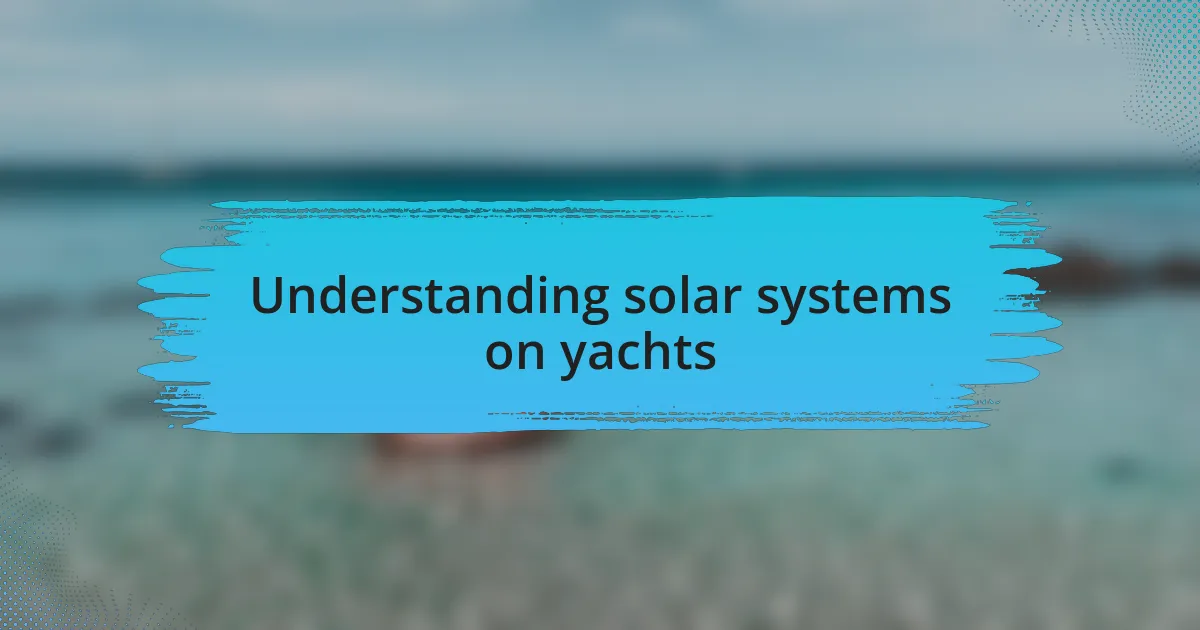
Understanding solar systems on yachts
When I first encountered solar systems on yachts, I was struck by the simplicity and elegance of harnessing the sun’s power. Imagine cruising across pristine waters, knowing that the energy powering your refrigerator and lights comes from the very sun above you. The idea of being self-sufficient while sailing – that’s luxury at its finest, isn’t it?
Understanding the components of a solar system on a yacht is crucial for maximizing efficiency. It’s not just about the solar panels; the battery banks, charge controllers, and inverters play pivotal roles too. For instance, when I upgraded to a higher-capacity battery bank, I noticed a significant improvement in how long I could run various systems, even on cloudy days. Have you experienced the freedom that comes with reliable energy independence while indulging in the beauty of nature?
The installation and positioning of solar panels can be a game-changer in yacht performance. I remember a trip where we recalibrated our panel angle to catch the midday sun better, and it made all the difference. Each time I see those panels soaking in sunlight, I can’t help but feel grateful for the innovations that allow us to embrace a sustainable lifestyle, even while enjoying the luxuries of life at sea.
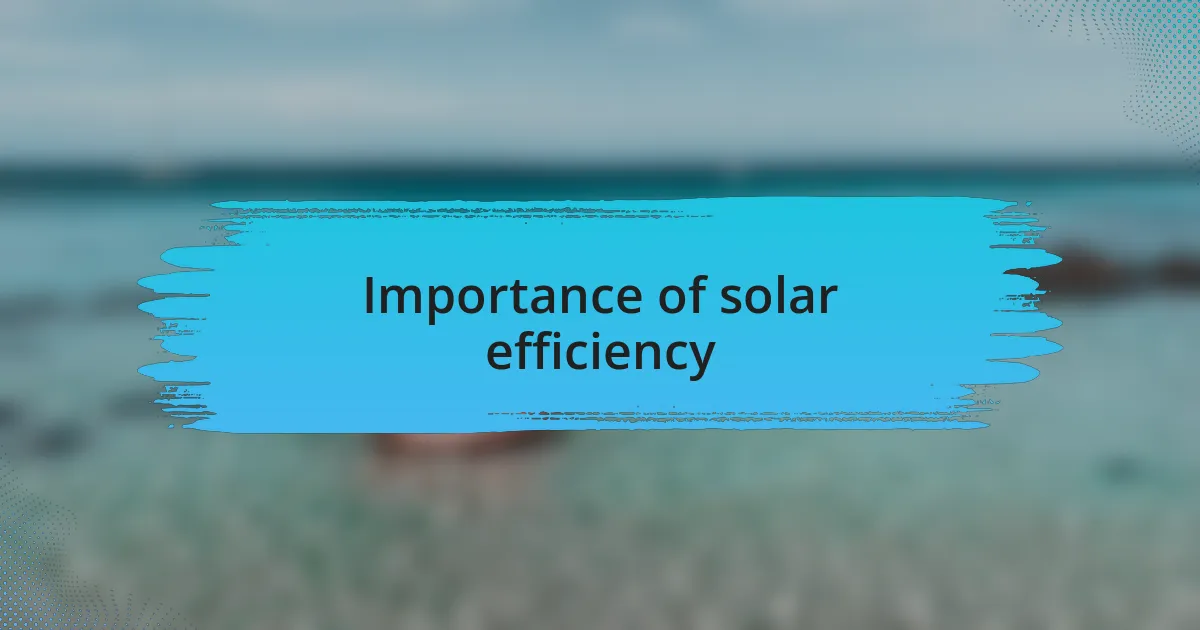
Importance of solar efficiency
The efficiency of a solar system on a yacht directly influences the overall experience on the water. I vividly recall a day when our energy usage exceeded our production; it felt like sailing on borrowed time, constantly checking battery levels. Maintaining high solar efficiency means that I can fully enjoy the comforts of my yacht without the anxiety of depleting resources or needing to fire up the generator.
When I think about solar efficiency, it’s not just about saving money – it’s about embracing a lifestyle that respects the environment. One summer, we sailed to a secluded bay where the peace was palpable, made even more enjoyable by knowing my energy wasn’t costing the Earth. Isn’t it rewarding to know that your luxurious adventures have a minimal ecological footprint?
Moreover, an efficient solar system opens up opportunities for longer trips away from the dock. I often reminisce about an unforgettable week-long voyage where our energy needs were seamlessly met, allowing us to explore hidden coves without returning to the harbor. Have you considered how solar efficiency could enhance your adventures, providing the freedom to roam without limits?
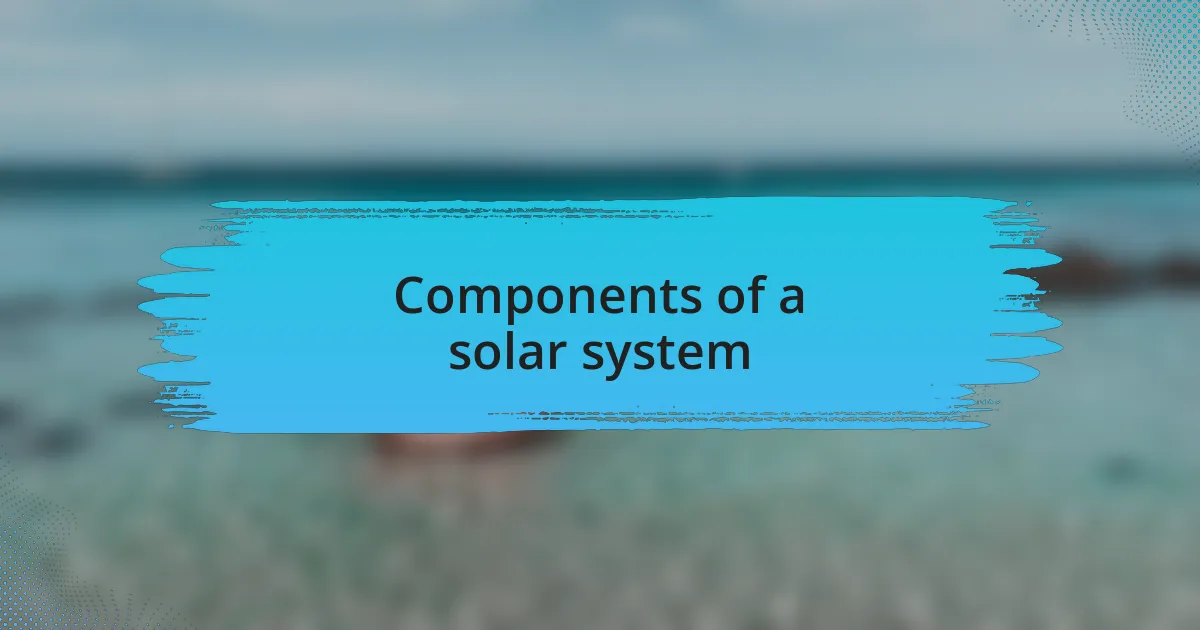
Components of a solar system
The key components of a solar system start with solar panels, which capture sunlight and convert it into usable electricity. When I upgraded to high-efficiency panels last season, I was astounded by their performance; they consistently delivered energy even on cloudy days. This shift not only maximized our energy capture but also minimized the number of panels needed on the deck, allowing for a sleeker appearance.
Next in the lineup is the inverter, which plays a crucial role in transforming the direct current (DC) generated by the panels into alternating current (AC) for our yacht’s systems. I recall the moment we switched to a hybrid inverter that managed both solar and shore power. It felt like a game-changer, as it optimized our energy use effortlessly and kept everything running smoothly. Have you ever thought about how the right inverter can expand your yacht’s capabilities, making the entire system more reliable?
Lastly, we can’t overlook the importance of battery storage. In my experience, having a robust battery bank is essential for those nights anchored under the stars, when energy needs might fluctuate. I learned the hard way during one voyage, when our batteries were depleted just as I wanted to enjoy some evening lights. Now, with upgraded deep-cycle batteries, I have peace of mind knowing that our energy supply is secure, making those magical nights on the water truly unforgettable.
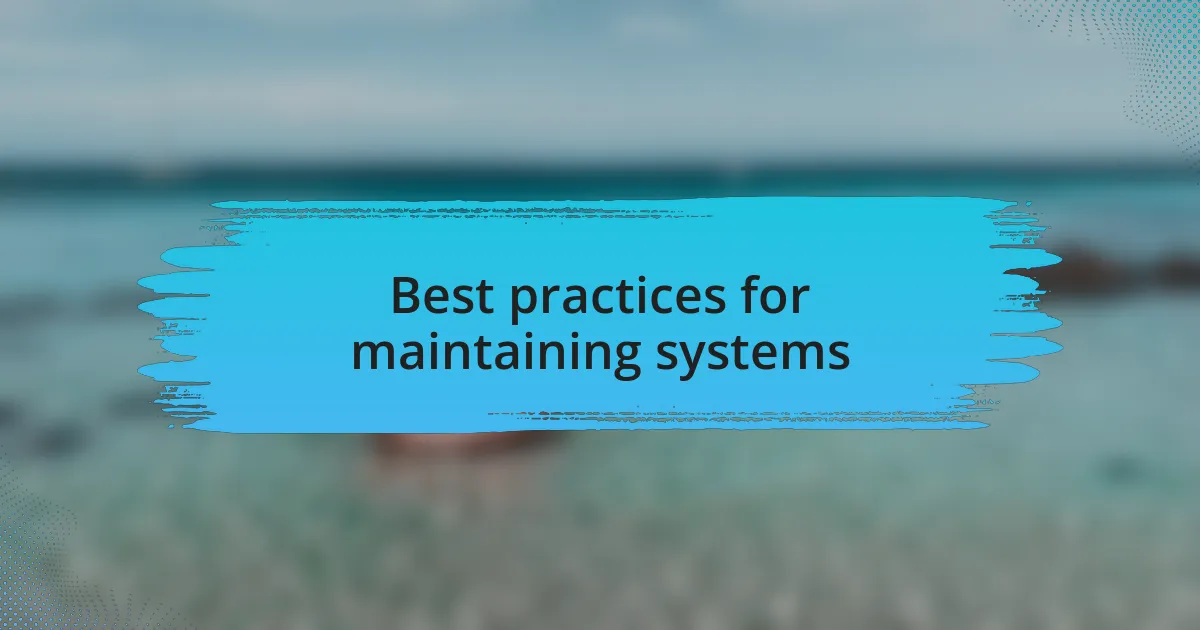
Best practices for maintaining systems
One of the best practices I follow for maintaining my solar system is routine inspection and cleaning of the solar panels. I remember the first time I allowed dust and debris to accumulate; it felt like I was throwing money away. Now, I make it a point to check them regularly—after all, even a small buildup can reduce efficiency significantly. Have you ever looked at your panels and thought they looked fine, only to realize they weren’t performing as expected?
Next, keeping the inverter’s firmware updated is an essential practice I can’t stress enough. During a recent trip, I learned this the hard way when my inverter struggled to communicate with the new battery management system. After updating it, everything harmonized beautifully, and I could feel the difference in energy efficiency immediately. Staying proactive with software updates not only avoids headaches but also enhances the overall system reliability.
Lastly, I focus on monitoring the battery levels and usage patterns. It’s fascinating how understanding these aspects can lead to better energy management onboard. I suggest setting up a monitoring system; during a long journey last fall, I used a smartphone app to track our battery status in real-time. This practice allowed us to make adjustments on the fly, keeping our energy levels in check and preventing any surprises, like running low during a stunning sunset. How have you managed your energy deployment while out at sea?

Personal strategies for my yacht
When it comes to optimizing my yacht’s solar system, I prioritze optimizing energy use by strategically scheduling activities during peak sunlight hours. On one occasion, I planned all our cooking and laundry during the afternoon when the sun was at its strongest. This not only maximized our energy production but also created a delightful atmosphere on board, making the most out of our time at sea. Have you ever considered how the timing of your daily tasks could harness solar power better?
Another personal strategy I’ve adopted is investing in energy-efficient appliances. I remember a time when I was excited to use conventional appliances, but soon realized the energy drain was significant. Switching to energy-efficient alternatives was a game-changer; I felt more in control of our consumption without sacrificing luxury. It’s a small change that makes a big impact—have you thought about how much energy your appliances are draining?
Lastly, I’ve made it a habit to embrace energy conservation methods during our trips. Simple actions like turning off devices when not in use or using LED lights significantly lower the load on our system. The difference in the energy budget was clear during a night sailing adventure; being mindful allowed us to enjoy the serene night without fearing depleting our energy reserves. How do you face the balance between luxury and efficiency while enjoying your time on the water?
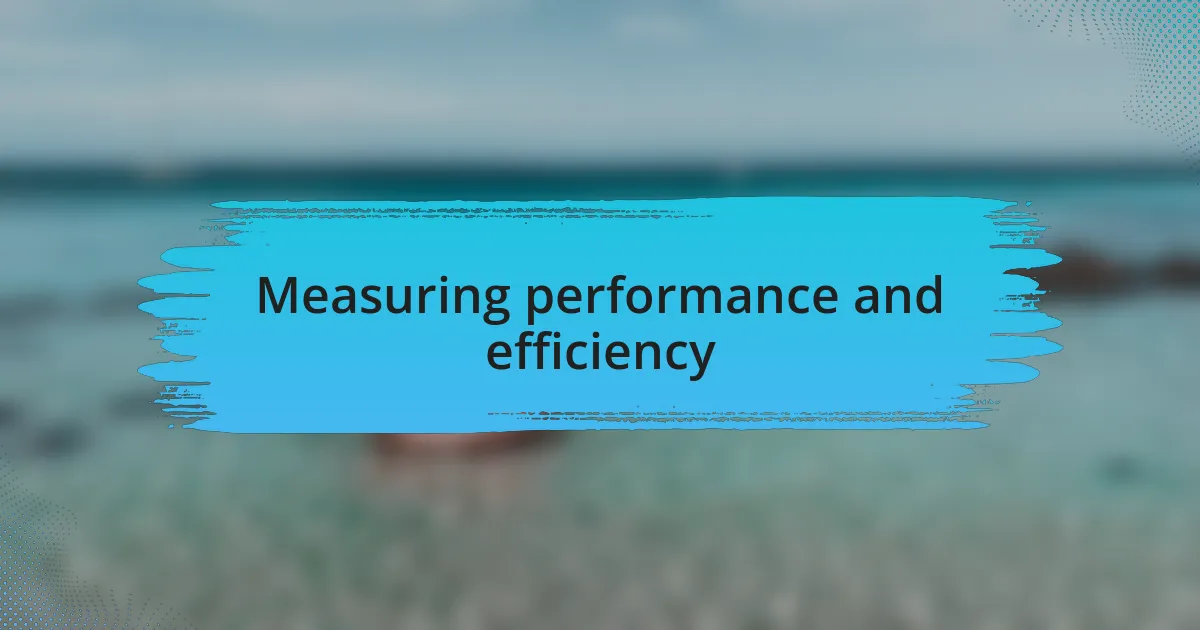
Measuring performance and efficiency
Measuring the performance of my solar system on the yacht is an ongoing commitment that I take seriously. I regularly monitor the energy output using a reliable solar monitor, checking the kilowatts generated each day. Observing the fluctuations based on weather conditions or shading from the sails has taught me the importance of awareness in maintaining peak efficiency. Have you kept track of how external factors can impact your energy systems?
Additionally, I conduct periodic assessments of battery health and performance to ensure longevity and efficiency. After one particularly long trip, I noticed a decrease in overall energy storage, which prompted me to invest in a quality battery management system. This not only improved my energy calculations but also provided peace of mind while sailing—knowing that my power supply was at its peak efficiency was immensely reassuring. Have you considered the role your battery system plays in your overall energy strategy?
Lastly, I find great value in using data to refine my energy practices. By analyzing usage patterns over time, I’ve been able to identify habits that either boost or hinder performance. For instance, I realized that reducing energy consumption during early mornings improved our overall energy availability throughout the day. This continuous learning process has transformed how I approach life aboard—and it’s a journey I cherish. What insights have you gained from tracking your energy usage?
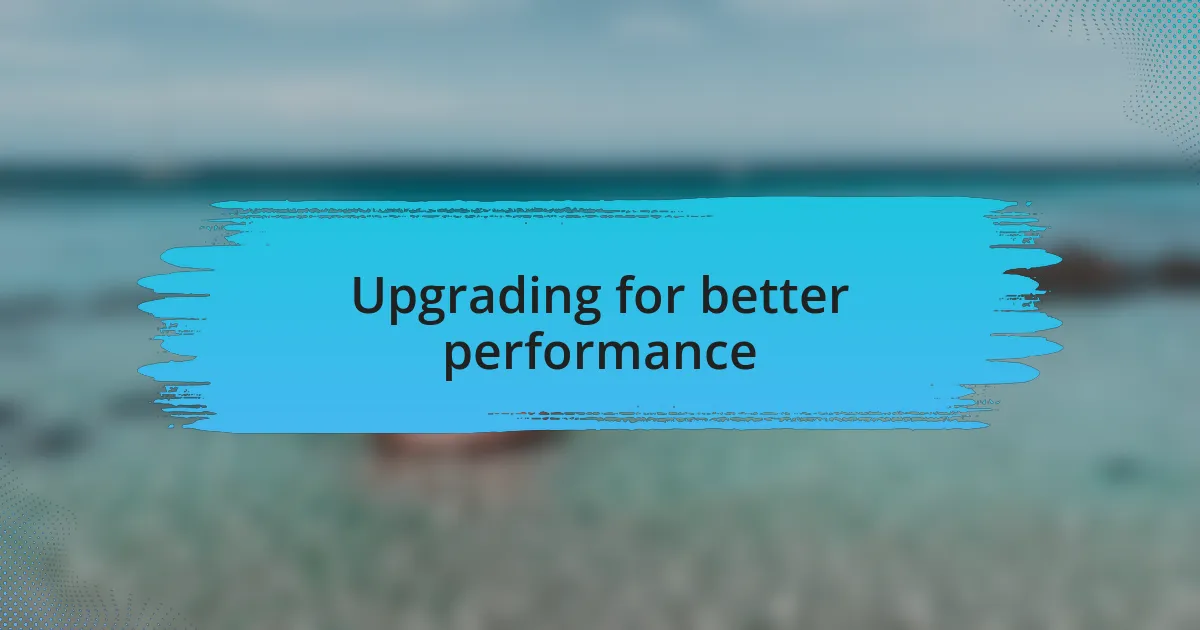
Upgrading for better performance
Upgrading my solar system isn’t just about necessity; it’s about maximizing enjoyment on the water. After installing high-efficiency solar panels, I felt an immediate difference in power output. It was exhilarating to see my energy goals not only met but exceeded, allowing me to power more luxury amenities without sacrificing comfort. Have you ever felt the thrill of upgrading something that fundamentally enhances your experience?
On another occasion, I invested in a solar inverter with advanced technology that optimized energy conversion. The sleek design and improved functionality provided a seamless integration with my existing setup. This upgrade allowed for real-time monitoring through a mobile app, giving me instant insights into performance. It transformed my relationship with the system; instead of just managing energy, I began to actively engage with and appreciate the technology at play. Doesn’t using technology that enhances your lifestyle feel empowering?
Lastly, I emphasize the importance of matching upgrades to my specific lifestyle on the yacht. For instance, adding a smart energy management system was a game-changer. It not only predicted energy needs based on my habits but also adjusted the solar output accordingly, which meant less guesswork for me. This personalized approach was like having a virtual assistant dedicated to energy efficiency, making life on board feel more effortless and enjoyable. What tailored improvements have you considered to elevate your own experience?